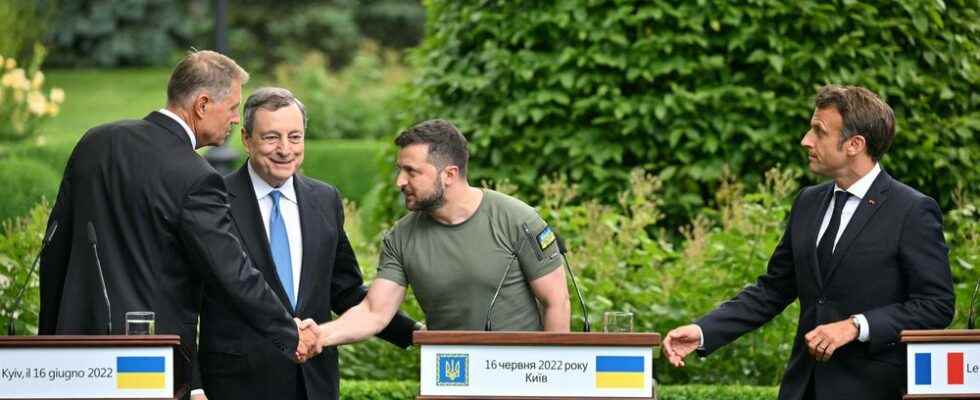The image will no doubt go down in the annals of a war of which we know neither the outcome nor the number of days that separate Ukraine from the end of the fighting and the rain of shells falling on its cities and countryside. In the bucolic setting of the gardens of the Ukrainian presidential palace, in the midst of birds parading above the heads of the five heads of state, Volodymyr Zelensky welcomed this Thursday, June 16, his French counterpart and President of the European Union, Emmanuel Macron , the German Chancellor, Olaf Scholz, the Italian Prime Minister, Mario Draghi, and the Romanian President, Klaus Iohannis.
Broadcast on a delayed basis on European news channels so as not to pose any security risk to officials and journalists, the press conference had been awaited for several months by the Ukrainian government. If Olaf Scholz had already moved to the capital several weeks ago, Emmanuel Macron had promised to go there when he brought a concrete project for the Ukrainian people. More than three months into the Russian-precipitated war, all four European leaders were present. They expressed their support for Ukraine’s accession to the European Union on the eve of a long-awaited recommendation from the European Commission on the initiation of the procedure.
Emmanuel Macron, Olaf Scholz and Mario Draghi gave strong support to Ukraine on Thursday June 16 during a historic visit.
Sergei SUPINSKY / AFP
Support for immediate candidate status
“All four of us support the status of immediate candidate for membership, declared Emmanuel Macron, after talks with Ukrainian President Volodymyr Zelensky. This status will be accompanied by a roadmap and will also imply that either taking into account the situation in the Balkans and the neighbourhood, in particular Moldova”. A position that the Ukrainian government welcomed with joy. Volodymyr Zelensky said he was “happy” and “satisfied” with the official European announcements.
“Ukraine is part of the European family”, Emmanuel Macron
At the same time, Mario Draghi “wants Ukraine in the European Union”. Germany, through the voice of Olaf Scholz, said he hoped for a “positive decision” after the study of the country’s candidacy led by the former comedian of the now cult series “Servant of the people”. Will the support shown by the leaders of the most important countries of the European Union make it possible to accelerate Ukraine’s integration project?
Ukraine says it is “ready” and “on the job”. Nevertheless, several specialists and members of various chancelleries have been repeating for several weeks that accession could take more than a decade. Turkey, for example, has been bogged down in the accession procedure since 1999. Ukraine has no doubt already gained precious time since the twenty-seven Member States must decide, from 23-24 June, whether to grant official status as a candidate for membership. Beyond the EU membership dossier, the delegation’s trip provided an opportunity for new forms of support from Europe.
Strengthening military support
Earlier in the day, the diplomatic delegation had set foot in Irpin, a town ravaged by Russian forces on the outskirts of the capital kyiv. Noting the “stigmata of barbarism” along the roads and at the foot of ruined buildings, Emmanuel Macron hailed the “heroism” of the Ukrainian army there. “We will continue our action so that war crimes do not go unpunished and so that international law applies,” then insisted the French head of state at the foot of the presidential palace. In the process, France announced the provision of a DNA laboratory to enable the Ukrainian authorities to investigate war crimes. A promise of delivery that hides another: new supplies of weapons are anticipated.
France will deliver to Ukraine “six additional Caesars”, these self-propelled guns renowned for their precision and manufactured in France. They are added to 12 Caesars already delivered since the start of the conflict. A war effort also agreed on the other side of the Rhine. German Chancellor Olaf Scholz has promised to help Ukraine militarily “as long” as the country needs.
Germany intends to make a long-term commitment to the Ukrainian nation, since the Chancellor has invited Volodymyr Zelensky to take part in the next G7 summit, at the end of June in Bavaria. The appointment is therefore made between the European leaders. Until then, the clashes continue. The war is not over.
